最新人教版五年级英语下册重点句型汇总
- 格式:pdf
- 大小:9.94 KB
- 文档页数:6
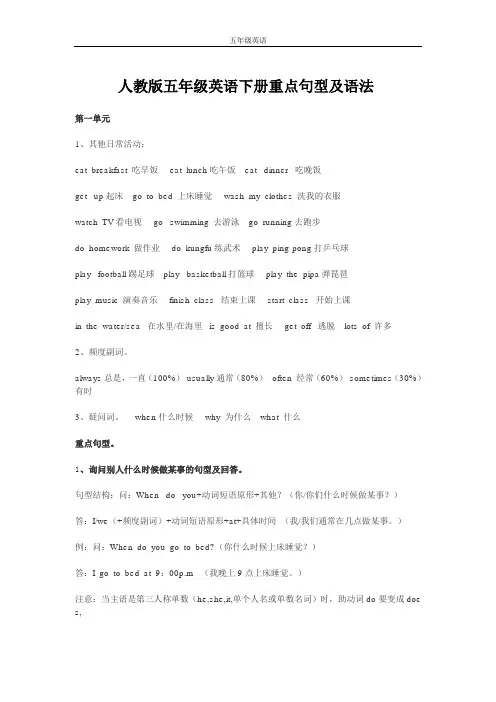
人教版五年级英语下册重点句型及语法第一单元1、其他日常活动:eat breakfast 吃早饭 eat lunch吃午饭 eat dinner 吃晚饭get up起床 go to bed 上床睡觉 wash my clothes 洗我的衣服watch TV看电视 go swimming 去游泳 go running去跑步do homework 做作业 do kungfu练武术 play ping-pong打乒乓球play football踢足球 play basketball打篮球 play the pipa弹琵琶play music 演奏音乐 finish class 结束上课 start class 开始上课in the water/sea 在水里/在海里 is good at 擅长 get off 逃脱 lots of 许多2、频度副词。
always总是,一直(100%)usually通常(80%) often 经常(60%)sometimes(30%)有时3、疑问词。
when什么时候 why 为什么 what 什么重点句型。
1、询问别人什么时候做某事的句型及回答。
句型结构:问:When do you+动词短语原形+其他?(你/你们什么时候做某事?)答:I/we(+频度副词)+动词短语原形+at+具体时间(我/我们通常在几点做某事。
)例:问:When do you go to bed?(你什么时候上床睡觉?)答:I go to bed at 9:00p.m (我晚上9点上床睡觉。
)注意:当主语是第三人称单数(he,she,it,单个人名或单数名词)时,助动词do要变成doe s,句型结构是:when does+主语(第三人称单数)+动词短语原形+其他?2、询问别人周末做什么的句型及回答。
句型结构:问:What do you do on the weekend?(你周末做什么?)答:I(+频度副词)+动词(短语)+其他。
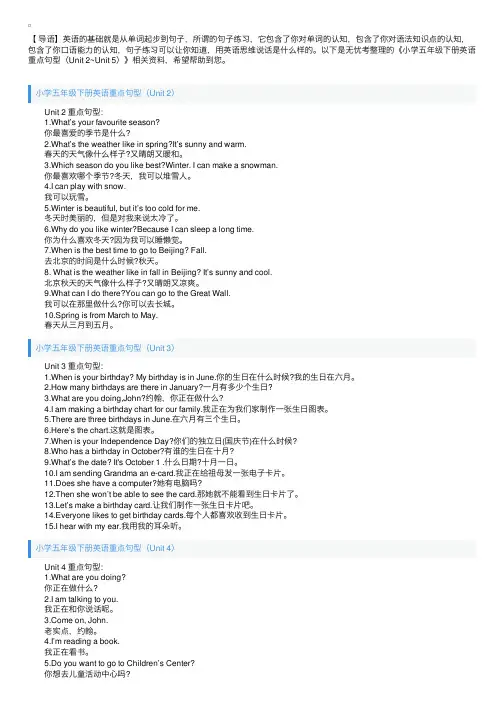
【导语】英语的基础就是从单词起步到句⼦,所谓的句⼦练习,它包含了你对单词的认知,包含了你对语法知识点的认知,包含了你⼝语能⼒的认知,句⼦练习可以让你知道,⽤英语思维说话是什么样的。
以下是⽆忧考整理的《⼩学五年级下册英语重点句型(Unit 2~Unit 5)》相关资料,希望帮助到您。
⼩学五年级下册英语重点句型(Unit 2) Unit 2 重点句型: 1.What’s your favourite season? 你最喜爱的季节是什么? 2.What’s the weather like in spring?It’s sunny and warm. 春天的天⽓像什么样⼦?⼜晴朗⼜暖和。
3.Which season do you like best?Winter. I can make a snowman. 你最喜欢哪个季节?冬天,我可以堆雪⼈。
4.I can play with snow. 我可以玩雪。
5.Winter is beautiful, but it’s too cold for me. 冬天时美丽的,但是对我来说太冷了。
6.Why do you like winter?Because I can sleep a long time. 你为什么喜欢冬天?因为我可以睡懒觉。
7.When is the best time to go to Beijing? Fall. 去北京的时间是什么时候?秋天。
8. What is the weather like in fall in Beijing? It’s sunny and cool. 北京秋天的天⽓像什么样⼦?⼜晴朗⼜凉爽。
9.What can I do there?You can go to the Great Wall. 我可以在那⾥做什么?你可以去长城。
10.Spring is from March to May. 春天从三⽉到五⽉。
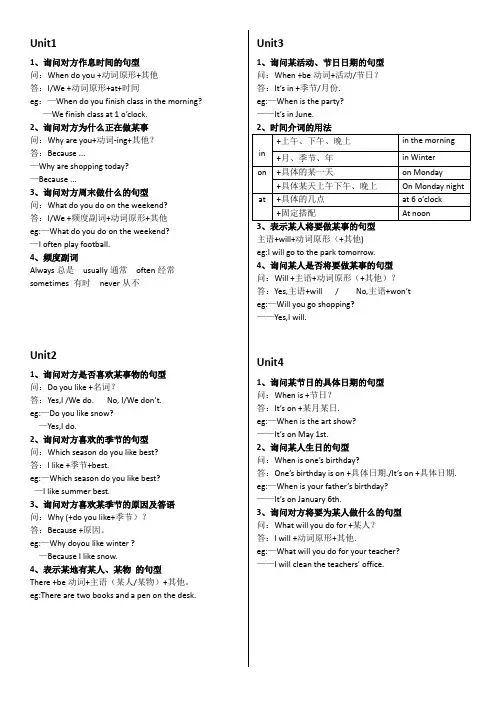
Unit11、询问对方作息时间的句型问:When do you +动词原形+其他答:I/We +动词原形+at+时间eg:—When do you finish class in the morning?—We finish class at 1 o’clock.2、询问对方为什么正在做某事问:Why are you+动词-ing+其他?答:Because ...—Why are shopping today?—Because ...3、询问对方周末做什么的句型问:What do you do on the weekend?答:I/We +频度副词+动词原形+其他eg:—What do you do on the weekend?—I often play football.4、频度副词Always总是usually通常often经常sometimes 有时never从不Unit21、询问对方是否喜欢某事物的句型问:Do you like +名词?答:Yes,I /We do. No, I/We don’t. eg:—Do you like snow?—Yes,I do.2、询问对方喜欢的季节的句型问:Which season do you like best?答:I like +季节+best.eg:—Which season do you like best?—I like summer best.3、询问对方喜欢某季节的原因及答语问:Why (+do you like+季节)?答:Because +原因。
eg:—Why doyou like winter ?—Because I like snow.4、表示某地有某人、某物的句型There +be动词+主语(某人/某物)+其他。
eg:There are two books and a pen on the desk.Unit31、询问某活动、节日日期的句型问:When +be动词+活动/节日?答:It’s in +季节/月份.eg:—When is the party?——It’s in June.主语+will+动词原形(+其他)eg:I will go to the park tomorrow.4、询问某人是否将要做某事的句型问:Will +主语+动词原形(+其他)?答:Yes,主语+will / No,主语+won’t eg:—Will you go shopping?——Yes,I will.Unit41、询问某节日的具体日期的句型问:When is +节日?答:It’s on +某月某日.eg:—When is the art show?——It’s on May 1st.2、询问某人生日的句型问:When is one’s birthday?答:One’s birthday is on +具体日期./It’s on +具体日期. eg:—When is your father’s birthday?——It’s on January 6th.3、询问对方将要为某人做什么的句型问:What will you do for +某人?答:I will +动词原形+其他.eg:—What will you do for your teacher?——I will clean the teachers’ office.1、描述物品归属的句型物品+ be动词(is/are)+(mine/his/hers/yours/ours/theirs) eg:The book is yours.2、确认物品归属地句型问:be动词+this/that/these/those(+其他)+某人的?答:Yes,it is. Yes,they are./ No,it,is’t. No,they aren’t. eg:—Is that crayou his?——Yes,it is.3、询问物品归属的句型问:单数Whose+is it/this/that?复数Whose+are they/these/those?答:It’s/They’re+名词性物主代词/ 名词所有格eg:—Whose bag is this?——It’s mine.4、现在进行时的一般疑问句问:Be动词+主语+动词-ing(+其他)?答:Yes,主语+be动词/ No,主语+be动词+not. eg:—Is she listening to music?——Yes,she is.5、描述某人正在做某事主语+be动词(am/is/are)+动词-ing(+其他).eg:I’m doing my homework now.6、询问某人能否做某事问:Can+主语+动词原形+其他?答:Yes,主语+can. /No,主语+can’t.eg:—Can I play football?——Yes,you can.Unit61、询问多个人或动物正在做什么的句型问:What are +主语(复数)+doing?答:主语(复数)+are+动词-ing+其他.eg:—What are the boys doing?——They are jumping2、询问单个人或动物正在做什么的句型问:What is +主语(单数)+doing?答:主语(单数)+is+动词-ing+其他.eg:—What is Tom doing?——He is playing football.。
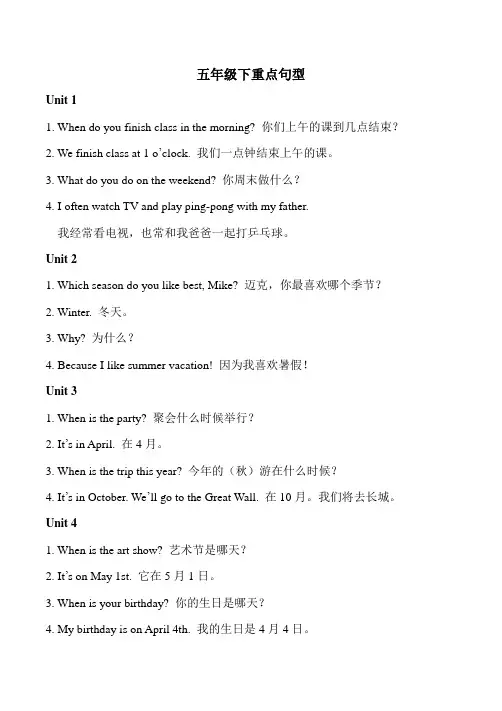
五年级下重点句型Unit 11. When do you finish class in the morning? 你们上午的课到几点结束?2. We finish class at 1 o’clock. 我们一点钟结束上午的课。
3. What do you do on the weekend? 你周末做什么?4. I often watch TV and play ping-pong with my father.我经常看电视,也常和我爸爸一起打乒乓球。
Unit 21. Which season do you like best, Mike? 迈克,你最喜欢哪个季节?2. Winter. 冬天。
3. Why? 为什么?4. Because I like summer vacation! 因为我喜欢暑假!Unit 31. When is the party? 聚会什么时候举行?2. It’s in April. 在4月。
3. When is the trip this year? 今年的(秋)游在什么时候?4. It’s in October. We’ll go to the Great Wall. 在10月。
我们将去长城。
Unit 41. When is the art show? 艺术节是哪天?2. It’s on May 1st. 它在5月1日。
3. When is your birthday? 你的生日是哪天?4. My birthday is on April 4th. 我的生日是4月4日。
Unit 51. The yellow picture is mine. 那幅黄颜色的画是我的。
2. Are these all ours? 这些都是我们的画吗?3. Whose is it? 这是谁的?4. It’s Zhang Peng’s. 是张鹏的。
5. Is he drinking water? 他在喝水吗?6. No, he isn’t. He’s eating. 不是。
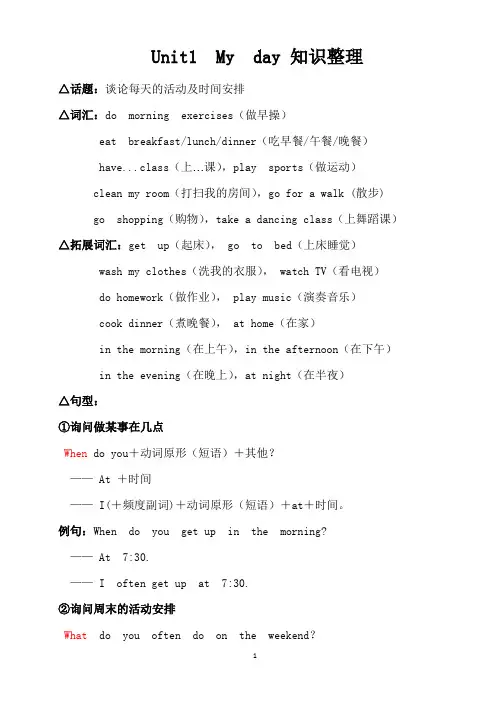
Unit1 My day 知识整理△话题:谈论每天的活动及时间安排△词汇:do morning exercises(做早操)eat breakfast/lunch/dinner(吃早餐/午餐/晚餐)have...class(上…课),play sports(做运动)clean my room(打扫我的房间),go for a walk (散步) go shopping(购物),take a dancing class(上舞蹈课)△拓展词汇:get up(起床), go to bed(上床睡觉)wash my clothes(洗我的衣服), watch TV(看电视)do homework(做作业), play music(演奏音乐)cook dinner(煮晚餐), at home(在家)in the morning(在上午),in the afternoon(在下午)in the evening(在晚上),at night(在半夜)△句型:①询问做某事在几点When do you+动词原形(短语)+其他?—— At +时间—— I(+频度副词)+动词原形(短语)+at+时间。
例句:When do you get up in the morning?—— At 7:30.—— I often get up at 7:30.②询问周末的活动安排What do you often do on the weekend?I often (always/sometime/usually) +…(周末的活动)+with … (某人)+on the weekend (on Saturdays/on Sundays ).例句:What do you do on the weekend ?I often take a dancing class with my friend on Sundays. △知识点:1:注意介词的搭配at +具体时间(几点)/night/home at 9 o ’clock in +国家/季节 in Spainon +星期 on the weekend/on Sundays with +人 with my father/mother/friend 2:表示时间频率词的区别always 表示总是,一直;usually 表示经常,通常;often 表示经常,常常;sometimes 表示有时,间或。
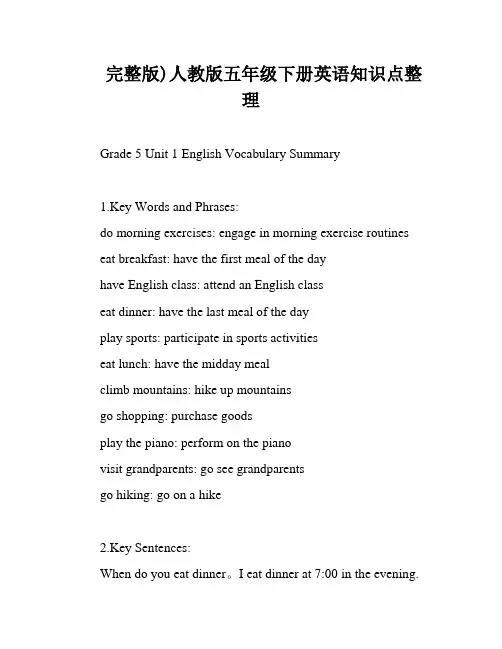
完整版)人教版五年级下册英语知识点整理Grade 5 Unit 1 English Vocabulary Summary1.Key Words and Phrases:do morning exercises: engage in morning exercise routines eat breakfast: have the first meal of the dayhave English class: attend an English classeat dinner: have the last meal of the dayplay sports: participate in sports activitieseat lunch: have the midday mealclimb mountains: hike up mountainsgo shopping: purchase goodsplay the piano: perform on the pianovisit grandparents: go see grandparentsgo hiking: go on a hike2.Key Sentences:When do you eat dinner。
I eat dinner at 7:00 in the evening.When do you get up。
I usually get up at 12:00 at noon.What do you do on the weekend。
Usually。
I watch TV and go shopping。
Sometimes。
I go hiking.I often play football.3.Important Points:Synonyms: eat breakfast - have breakfast。
eat lunch - have lunch。
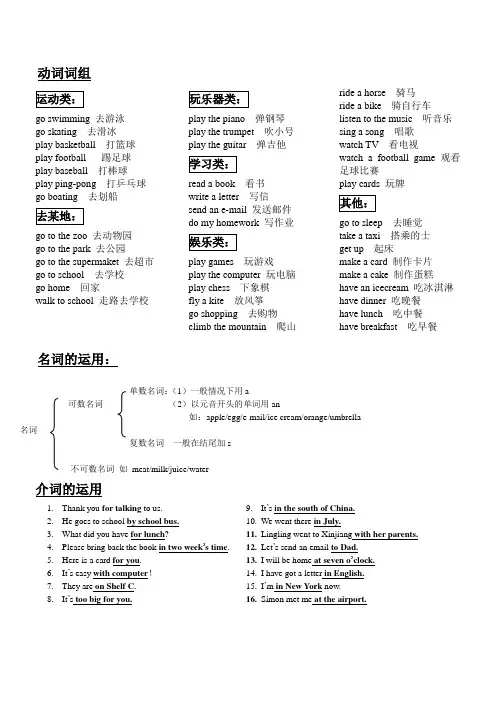
动词词组go swimming 去游泳go skating 去滑冰play basketball 打篮球play football 踢足球play baseball 打棒球play ping-pong 打乒乓球go boating 去划船go to the zoo 去动物园go to the park 去公园go to the supermaket 去超市go to school 去学校go home 回家walk to school 走路去学校play the piano 弹钢琴play the trumpet 吹小号play the guitar 弹吉他read a book 看书write a letter 写信send an e-mail 发送邮件do my homework 写作业play games 玩游戏play the computer 玩电脑play chess 下象棋fly a kite 放风筝go shopping 去购物climb the mountain 爬山ride a horse 骑马ride a bike 骑自行车listen to the music 听音乐sing a song 唱歌watch TV 看电视watch a football game 观看足球比赛play cards 玩牌go to sleep 去睡觉take a taxi 搭乘的士get up 起床make a card 制作卡片make a cake 制作蛋糕have an icecream 吃冰淇淋have dinner 吃晚餐have lunch 吃中餐have breakfast 吃早餐名词的运用:单数名词:(1)一般情况下用a可数名词(2)以元音开头的单词用an如:apple/egg/e-mail/ice cream/orange/umbrella 名词复数名词一般在结尾加s不可数名词如meat/milk/juice/water介词的运用1.Thank you for talking to us.2.He goes to school by school bus.3.What did you have for lunch?4.Please bring back the book in two week’s time.5.Here is a card for you.6.It’s easy with computer!7.They are on Shelf C.8.It’s too big for you.9.It’s in the south of China.10.We went there in July.11.Lingling went to Xinjiang with her parents.12.Let’s send an email to Dad.13.I will be home at seven o’clock.14.I have got a letter in English.15.I’m in New York now.16.Simon met me at the airport.一般过去时:表示过去某个时间里发生的动作或状态。
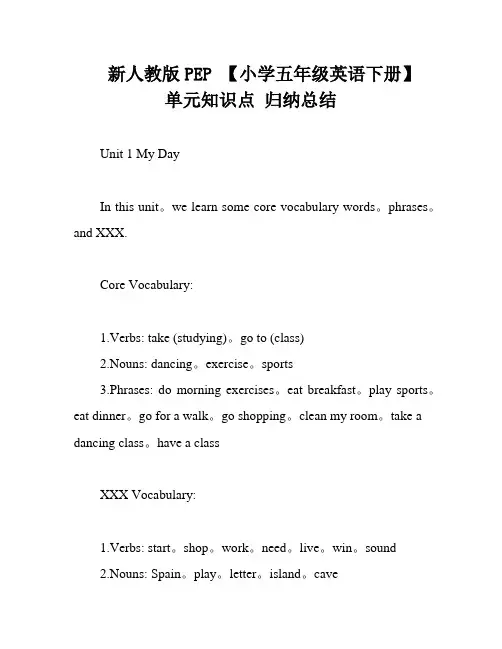
新人教版PEP 【小学五年级英语下册】单元知识点归纳总结Unit 1 My DayIn this unit。
we learn some core vocabulary words。
phrases。
and XXX.Core Vocabulary:1.Verbs: take (studying)。
go to (class)2.Nouns: dancing。
exercise。
sports3.Phrases: do morning exercises。
eat breakfast。
play sports。
eat dinner。
go for a walk。
go shopping。
clean my room。
take a dancing class。
have a classXXX Vocabulary:1.Verbs: start。
shop。
work。
need。
live。
win。
sound2.Nouns: Spain。
play。
letter。
island。
cave3.ns: after4.XXX: when。
XXX。
a.m。
p.m。
why。
last。
also。
busy5.nal Vocabulary: frequency adverbs (always。
usually。
sometimes)Phrases:watch TV。
eat lunch。
go to bed。
go swimming。
go home。
go to schoolCore Sentence Structure:When do you do morning exercises?" "At 7 o'clock."XXX phrase is "good job" to praise XXX.Which season do you like best。
I like winter best。
This sentence means "which one do you like the most" and "like。
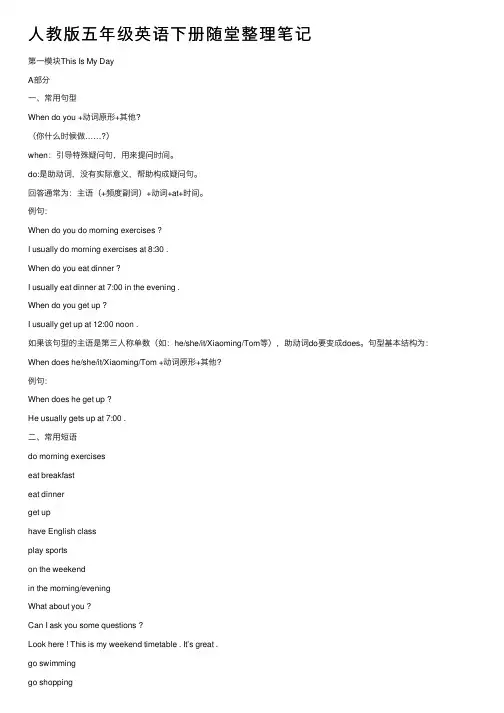
⼈教版五年级英语下册随堂整理笔记第⼀模块This Is My DayA部分⼀、常⽤句型When do you +动词原形+其他?(你什么时候做……?)when:引导特殊疑问句,⽤来提问时间。
do:是助动词,没有实际意义,帮助构成疑问句。
回答通常为:主语(+频度副词)+动词+at+时间。
例句:When do you do morning exercises ?I usually do morning exercises at 8:30 .When do you eat dinner ?I usually eat dinner at 7:00 in the evening .When do you get up ?I usually get up at 12:00 noon .如果该句型的主语是第三⼈称单数(如:he/she/it/Xiaoming/Tom等),助动词do要变成does。
句型基本结构为:When does he/she/it/Xiaoming/Tom +动词原形+其他?例句:When does he get up ?He usually gets up at 7:00 .⼆、常⽤短语do morning exerciseseat breakfasteat dinnerget uphave English classplay sportson the weekendin the morning/eveningWhat about you ?Can I ask you some questions ?Look here ! This is my weekend timetable . It’s great .go to schoolgo to workgo to bedgo homeexcuse meI am sorry.Sometimes I climb mountains .play the pianovisit grandparentswatch videosWhat do you do ?Tell us about your day !Thank you for telling me about your day .You’re welcome .三、单词when usually often at about too day ask work evening noon tell policeman some sure四、⼀般现在时⼀般现在时表⽰现在经常发⽣的动作、⾏为或存在的状态等。
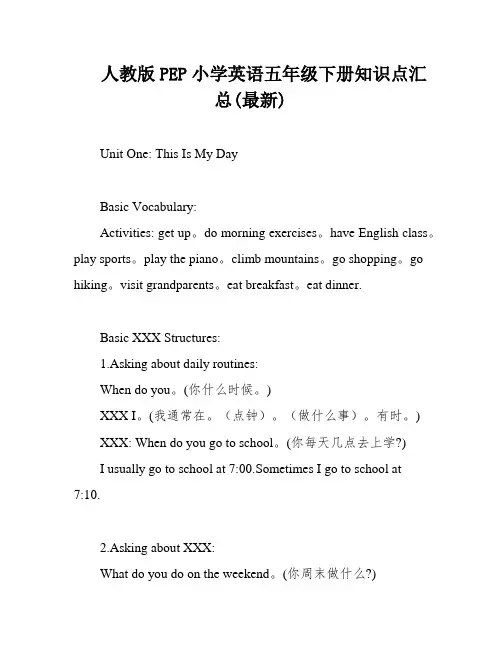
人教版PEP小学英语五年级下册知识点汇总(最新)Unit One: This Is My DayBasic Vocabulary:Activities: get up。
do morning exercises。
have English class。
play sports。
play the piano。
climb mountains。
go shopping。
go hiking。
visit grandparents。
eat breakfast。
eat dinner.Basic XXX Structures:1.Asking about daily routines:When do you。
(你什么时候。
)XXX I。
(我通常在。
(点钟)。
(做什么事)。
有时。
)XXX: When do you go to school。
(你每天几点去上学?)I usually go to school at 7:00.Sometimes I go to school at7:10.2.Asking about XXX:What do you do on the weekend。
(你周末做什么?)XXX I。
(我通常/经常。
有时。
)XXX: What do you do on the weekend?I often play XXX I go shopping with my mom.3.Introducing one's own habits:Every weekend。
I go hiking。
(我每个周末远足。
)Every day。
I do my homework at 8:00 in the evening。
(我每天晚上8点做作业。
)4.Asking XXX:What do you do。
(你是干什么的?)Time:morning。
afternoon。
evening。
noon。
at night。
6:00.on Sunday。
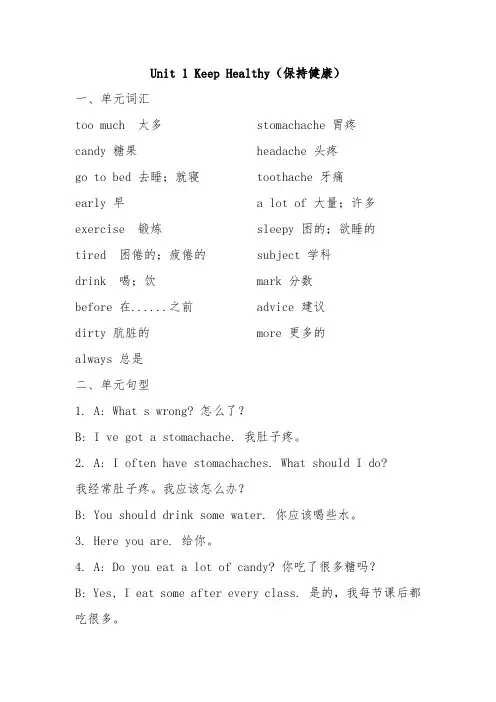
Unit 1 Keep Healthy(保持健康)一、单元词汇too much 太多candy 糖果go to bed 去睡;就寝early 早exercise 锻炼tired 困倦的;疲倦的drink 喝;饮before 在......之前dirty 肮脏的always 总是stomachache 胃疼headache 头疼toothache 牙痛a lot of 大量;许多sleepy 困的;欲睡的subject 学科mark 分数advice 建议more 更多的二、单元句型1. A: What s wrong? 怎么了?B: I ve got a stomachache. 我肚子疼。
2. A: I often have stomachaches. What should I do?我经常肚子疼。
我应该怎么办?B: You should drink some water. 你应该喝些水。
3. Here you are. 给你。
4. A: Do you eat a lot of candy? 你吃了很多糖吗?B: Yes, I eat some after every class. 是的,我每节课后都吃很多。
5. You shouldn t eat too much candy. 你不该吃太多糖。
6. A: Do you wash your hands before eating? 你饭前洗手了吗?B: Not always. 不总洗。
7. You shouldn t eat with dirty hands. 你不该用脏手吃饭。
8. You should always wash your hands before eating.你应该坚持饭前洗手。
9. I always feel tired and sleepy. 我总觉得很累很困。
10. I have some advice for you. 我给你一些建议。
人教版五年级下册英语第五单元重点短语人教版五年级下册英语第五单元重点短语一、Greeting and Introduction1. Good morning. 早上好。
2. How are you? 你好吗?3. I'm fine, thank you. 我很好,谢谢。
4. What's your name? 你叫什么名字?5. My name is... 我叫...6. Nice to meet you. 很高兴见到你。
在日常生活中,问候和自我介绍是经常接触的内容。
在学习英语时,掌握这些基础短语是非常必要的。
二、Asking for and Giving Directions1. Excuse me, where is the restroom? 对不起,请问卫生间在哪里?2. Turn left/right. 向左/右转。
3. It's across from... 它在...的对面。
4. Go straight. 直走。
5. It's next to... 它在...旁边。
6. Can you show me on the map? 你能在地图上给我指路吗?在旅行或者在外出时,问路和指路是非常实用的短语。
掌握了这些短语,可以帮助我们快速找到目的地。
三、Numbers and Time1. How much is it? 它多少钱?2. It's twenty dollars. 它是二十美元。
3. What time is it? 几点了?4. It's 8 o'clock. 8点。
5. Can you tell me the time? 你能告诉我时间吗?6. It's a quarter past nine. 九点一刻了。
在日常生活中,我们需要了解数字和时间的表达。
这些短语可以帮助我们顺利完成日常生活的事务。
四、Food and Drink1. I'd like a hamburger, please. 我要一个汉堡包。
五年级英语下册重点句型汇总(人教版)基本句型:1询问喜欢哪个季节:⑴---hihseasnduliebest?你最喜欢哪个季节?---Ilie+季节+best---或:Iliesuer,beauseIansiinthesea⑵---hatisurfavuriteseasn?你最喜爱的季节是什么?---Spring∕suer∕fall∕interisfavuriteseasn2询问天气:---hatistheeatherlieinfallinBeiing?北京秋天的天气是怎么样的?---Itissunnandl3询问理由:---hdulieinterbest?为什么你最喜欢冬天?---BeauseIanplaithsnandaeasnan4询问想要做什么---hatuldulietd?---I’dlietlib∕plasprts……询问具体季节---hatseasnisitinarhinBeiing?北京的三月份是什么季节?---Itisspring6询问能做什么---hatanIdthere?我在那里能做什么?---uangttheGreatall你可以去长城。
7询问接下来打算去哪里?---hereareugingnvaatin?假期你打算去哪里?---Iagingtanada我将要去加拿大。
8SuerisfrunetAugust六月至八月是夏天。
9HdIl?我看起来怎么样?10Sendeapstard寄明信片给我。
11HdidTHAThappen?那是怎么发生的!12henisthebesttietgtBeiing?Fall什么时候最适合去北京?秋天。
知识延伸:1特殊疑问句:⑴hih引导的特殊疑问句,询问喜欢哪个季节:hihseasnduliebest?⑵h引导的特殊疑问句,询问喜欢某个季节的原因:hduliesuer?⑶hen引导的特殊疑问句,询问什么时候:henisthebesttietgtBeiing?2第三人称单数形式:sa—sasas—asse—es3单复数:tree—treesleaf—leaves4同义词:fall—autun秋天同义句:hihseasnduliebest?-----hat’surfavuriteseasn?6sn下雪的lud多云的rain下雨的基本句型:1询问生日的时间:⑴----henisur/his/herbirthda?你的/他的/她的生日在什么时候?----/his/herbirthdaisinune在六月。
人教版PEP五年级英语下册各单元语法点Unit 1: What Does She Do?- 一般现在时:用于描述日常活动或惯。
主语为第三人称单数时,动词加-s或-es。
- 观察寻找规律:第三人称单数的动词加-s或-es。
- Be动词+动词-ing:用于描述正在进行的动作。
主语为第三人称单数时,be动词用is。
- 一般现在时的否定句:在动词前面加don't/doesn't。
- 一般现在时的疑问句:将do/does置于主语之前。
Unit 2: Can You Run?- Can的用法:用于表示能力和询问对方是否能够做某事。
- Can的否定形式:在can后面加not或缩略形式can't。
- Can的疑问形式:将can置于句首。
Unit 3: What Are They Doing?- 现在进行时:用于描述正在进行的动作。
动词加-ing。
- 现在进行时的否定句:在be动词后面加not。
- 现在进行时的疑问句:将be动词置于句首。
Unit 4: I'm Sitting at the Front.- 介词短语表示地点:用于描述人或物所在的位置。
- 介词on、in、under、behind、in front of、next to等的用法。
Unit 5: What Are You Going to Do?- be going to的用法:表示将来要做的事情。
- be going to的否定形式:在be动词后面加not。
- be going to的疑问形式:将be动词置于句首。
Unit 6: It's Raining!- 祈使句:用于表示请求、命令或建议。
动词原形作谓语。
- 祈使句的否定形式:在动词前面加don't。
- 祈使句的疑问形式:用Do开头。
Unit 7: How Often Do You Exercise?- 表示频率的副词:用于描述动作发生的频率。
- always, usually, often, sometimes, hardly ever, never等的用法。
Unit 1重点句型1.When do you...?是由When引导的特殊疑问句,用于询问时间,在具体的时刻前面通常用介词at.通常回答为:主语+频率副词(always,usually,often,sometimes,never)+动词(短语)+at+时间点。
例如:--When do you often get up?你经常几点起床?--I often get up at 6 o’clock.我经常6点起床。
When do you often get up?=What time do you get up?2.当此句型的主语是第三人称单数(he,she,John等)时,助动词要变成does。
句型结构为:When does+主语(第三人称单数)+动词原形+其他。
通常回答为:主语(第三人称单数)+频率副词(always,usually,often,sometimes,never)+动词(短语)+at+时间点。
例如:--When does he get up?他经常几点起床?--He often get s up at 6 o’clock.他经常6点起床。
3.What引导的特殊疑问句,就活动内容进行问答:句型结构为:What+do+主语+do+时间?通常回答为:主语+频率副词(always,usually,often,sometimes,never)+动词短语+时间。
或者 ---Always / Sometimes / Often / Usually+ 主语+动词短语+时间。
例如:--What do you do on the weekend? 你周末做什么?I often play football on the weekend. 我经常在周末踢足球。
4.当主语是第三人称单数时,助动词用does。
其句型结构为:What+does+主语+do+时间?通常回答为:主语(第三人称)+频率副词(always,usually,often,sometimes,never)+动词短语+时间。
人教版五年级英语下册全册知识点总结回答方式多样,以下是一些例子:I usually play sports or go shopping on the weekend.(我通常在周末进行体育运动或去购物。
)I XXX(我周六上舞蹈课,周日在家休息。
)It depends。
Sometimes I hang out with friends。
sometimes I do some housework。
and sometimes I just watch TV.(这要看情况。
有时我和朋友出去玩,有时我做些家务,有时我就看电视。
)注意:询问别人周末做什么时,可以使用what或how来引导问句。
回答时,可以使用usually。
sometimes等频度副词来表达经常性或偶尔性的活动。
Unit 1一、重点词汇吃早餐:eat breakfast 上······课:have。
class进行体育运动:play sports做早操:do morning exercises 打扫我的房间:clean my room 去购物:go shopping舞蹈:dancing上午:a.m.通常地:usually二、其他日常活动起床:get up上床睡觉:go to bed活动,运动:exercise吃晚饭:eat XXX散步:go for a walk研究,上(课):XXX上舞蹈课:take a dancing class下午:p.m.吃午饭:eat XXX洗脸:XXX洗我的衣服:XXX看电视:watch TV打乒乓球:play ping-pong弹琵琶:play the pipa去游泳:go swimming去跑步:go running做作业:do homework练武术:do XXX踢足球:play football打篮球:play basketball三、语音cl→ [cl]:clean。
五年级英语下册重点句型汇总(人教版)
基本句型:
1. 询问喜欢哪个季节:
⑴--- Which season do you like best? 你最喜欢哪个季节?
---I like +季节+ best. (例:I likespring∕summer∕fall∕winter best)
---或:I like summer, because I can swim in the sea.
⑵--- Whatis your favourite season? 你最喜爱的季节是什
么?
--- Spring∕summer∕fall∕winter is my favourite season.
2. 询问天气:
--- What is the weather like in fall inBeijing? 北京秋天的
天气是怎么样的?
--- It is sunny and cool.
3. 询问理由:
--- Why do you like winter best? 为什么你最喜欢冬天?
--- Because I can play with snow and make asnowman.
4. 询问想要做什么
--- What would you like to do?
--- I’d like to climb∕play sports…… ( I’d = I would )
5. 询问具体季节
--- What season is it in March in Beijing? 北京的三月份
是什么季节?
--- It is spring.
6. 询问能做什么
--- What can I do there? 我在那里能做什么?
--- You can go to the Great Wall. 你可以去长城。
7. 询问接下来打算去哪里?( be going to一般将来时)
--- Where are you going on vacation? 假期你打算去哪里?
--- I am going toCanada. 我将要去加拿大。
8. Summer is fromJune to August. 六月至八月是夏天。
9. How do Ilook? 我看起来怎么样?
10. Send me apostcard. 寄明信片给我。
11. How did THAThappen? 那是怎么发生的!
12. When is the best time to go to Beijing? Fall. 什么时候最适合去北京?秋天。
知识延伸:
1. 特殊疑问句:
⑴which 引导的特殊疑问句,询问喜欢哪个季节:
Which season do you like best?
⑵why 引导的特殊疑问句,询问喜欢某个季节的原因:
Why do you like summer?
⑶when 引导的特殊疑问句,询问什么时候:When is the best time to go to Beijing?
2. 第三人称单数形式:say—says (说) ask—asks (问) come—comes (来)
3. 单复数:tree—trees (树) leaf—leaves (叶子)
4. 同义词:fall—autumn 秋天
5. 同义句:Which season do you like best? ----- What’s yourfavourite season?
6. snowy 下雪的cloudy多云的rainy下雨的
基本句型:
1. 询问生日的时间:
⑴---- Whenis your / his / her birthday? 你的/ 他的/ 她的生日在什么时候?
---- My / his / her birthday is in June.在六月。
⑵---- Is your / his / her birthday inJuly? 你的/ 他的/ 她的生日在七月吗?
---- Yes, it is. / No, it isn’t.
2. 询问日期:
---- What is the datetoday? / What date is it today? 今天几号?
---- It is June 1st. 今天六月一号。
区分:(问星期)---- What dayis it today? 今天星期几?
---- It is Sunday. 今天星期天。
3. 问节日:
教师节是什么时候?
---- When is the Teachers’ Day?
---- It is September 10th.
4.询问一个月里有多少人生日:
---- How many birthdays arethere in January? 一月有多少人生日?
---- There are … .
5. 询问谁的生日在某月:
---- Who has a birthday in October? 谁的生日在十月?(同义句:Whose birthday is in Oct.?)
---- Me.我。
6. ---- What areyou doing,John?约翰,你在做什么?
---- I am making a birthday chart for ourfamily. 我正在做我们家的生日表。
7. ---- Does shehave a computer? 她有电脑吗?
---- No, she doesn’t. 不,她没有。
8. ---- Then shewon’t be able to see the card. 那她不可能看见这卡片。
(won’t = will not)
句型转换:
⒈肯定句→一般疑问句:
①把be动词(am/is/are)调到句首:
第一、二人称:My birthday is in June. ? Is your birthday in June?
第三人称:John’s birthday is May 1st. ? Is John’sbirthday May 1st?
(这里主要讲的是生日,因此回答一律用it 来回答:Yes,
it is. / No, itisn’t. )
②以助动词do的适当形式引导:
第一、二人称:Ihave a computer. ? Do you have a computer? (Yes, I do. / No, I don’t. )
第三人称:Shehas a computer. ? Does she have a computer? (Yes, she does. / No, she doesn’t.)
(当句子出现does的时候,句中的动词要使用动词的原
形。
)
⒉肯定句?否定句:在be动词(am/is/are)后+ not:
His birthday is in Jan. ? His birthday isn’tin Jan. ( is not = isn’t )
⒊划线提问:
⑴My birthday is in Feb.. →When is your birthday?
⑵Amy’sbirthday is Apr. 9th. → Whosebirthday is Apr.
9th ?
⑶John’s birthday is in Oct.. → Who hasa birthday in
Oct. ?
⑷There are five birt hdays in Jan.. →Howmany birthdays
are there in Jan.?
⑸The Children’s Day is June 1st. → When is the Children’sDay?
知识延伸:
⒈名词所有格:
⑴名词后直接+’s ;如:Amy’s , John’s, your father’s
,如:Teachers’ Day ,
⑵以s结尾的名词后+ ’
⒉关于时间介词:
⑴指在某一月份内,月份前+ in ,如:inJanuary ,in May
⑵指在几点钟时,时间前+ at ,如:at 8:00
⑶指具体某一天,或星期几时,日期、星期前+ on ,如,on June5th,on Monday
⒊关于序数词的写法与读法:
如:10月3日,写作:October3rd ;读作:Octoberthe third。